Premium Only Content
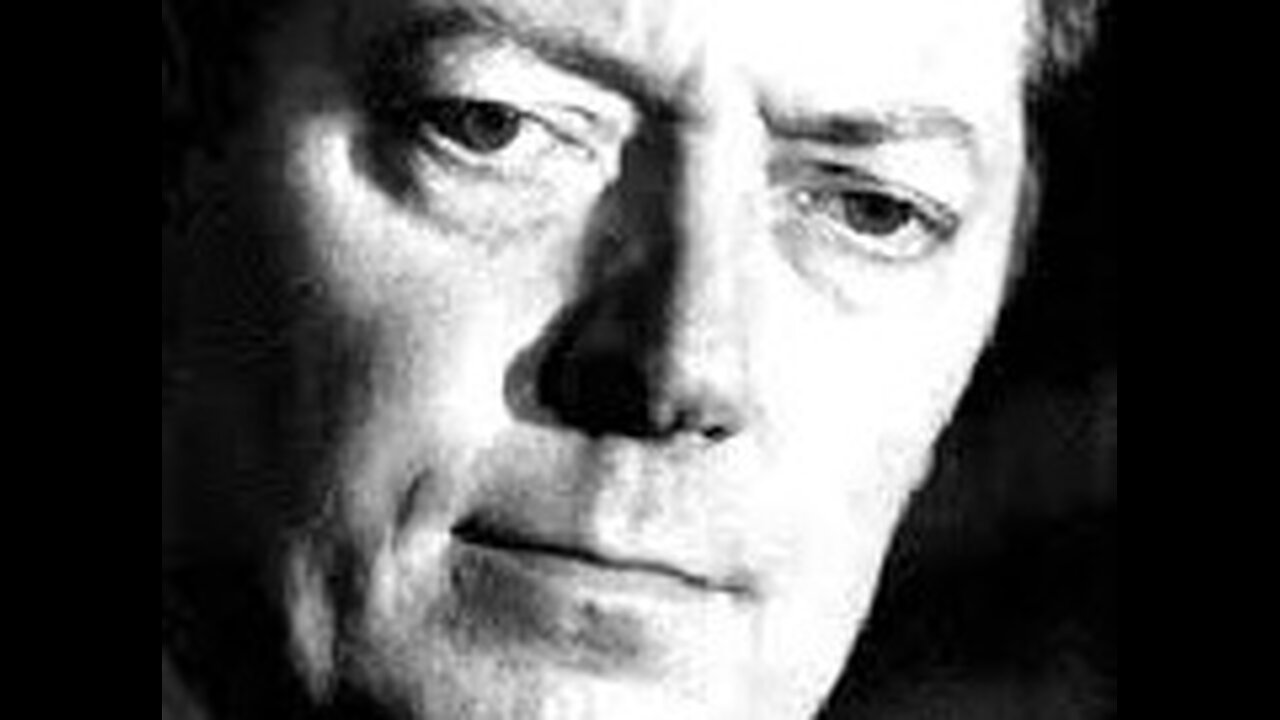
Jim Garrison, JFK's Assassination, and the Case That Should Have Changed History (2006)
James Carothers Garrison (born Earling Carothers Garrison; November 20, 1921 – October 21, 1992)[3] was the District Attorney of Orleans Parish, Louisiana, from 1962 to 1973 and later a state appellate court judge. A member of the Democratic Party, he is best known for his investigations into the assassination of John F. Kennedy and the prosecution of New Orleans businessman Clay Shaw to that effect in 1969, which ended in Shaw's acquittal. He wrote three published books, one of which became a prime source for Oliver Stone's film JFK in 1991, in which Garrison was portrayed by Kevin Costner, while Garrison himself made a cameo appearance as Earl Warren.
Early life and career
Garrison was born in Denison, Iowa, in 1921.[4][5][6] He was the first child and only son of Earling R. Garrison and Jane Anne Robinson who divorced when he was two years old.[3] His family moved to New Orleans quite early into his childhood, where he was raised by his divorced mother. He served in the U.S. Army Air Forces during World War II, having joined the year before the Japanese attack on Pearl Harbor. After the war he obtained a law degree from Tulane University Law School in 1949. He then worked for the Federal Bureau of Investigation (FBI) for two years where he was stationed with the Seattle office.[7] Leading up to the Korean War era, Garrison joined the National Guard, even applying for active duty with the Army in 1951, but because of recurring nightmares of past missions Garrison was then relieved of duty by the Army. Remaining in the Guard when it became apparent that he suffered from shell shock due to his numerous bombing missions flown during World War II[8] led one Army doctor to conclude that Garrison had a "severe and disabling psychoneurosis" which "interfered with his social and professional adjustment to a marked degree. He was considered totally incapacitated from the standpoint of military duty and moderately incapacitated in civilian adaptability."[9] Yet, when his record was reviewed further by the U.S. Army Surgeon General, he "found him to be physically qualified for federal recognition in the national army."[10] Upon returning again to civilian life, Garrison worked in several different trial lawyer positions before winning election as New Orleans District Attorney, starting with his first of three terms in January 1962.[7]
District attorney
In the years prior to winning office as New Orleans District Attorney in 1961, Garrison worked for the New Orleans law firm of Deutsch, Kerrigan & Stiles from 1954 to 1958, before he first became an assistant district attorney. Garrison became a flamboyant, colorful, well-known figure in New Orleans, but was initially unsuccessful in his run for public office. He lost a 1959 election for criminal court judge. In 1961, he ran for district attorney and won against incumbent Richard Dowling by 6,000 votes in a five-man Democratic primary. Despite lack of major political backing, he facilitated his victory through excellent performance in a television debate and last-minute television commercials.
Once in office, Garrison cracked down on prostitution and the abuses of Bourbon Street bars and strip joints. He indicted Dowling and one of his assistants for criminal malfeasance, but the charges were dismissed for lack of evidence. Garrison did not appeal. Garrison received national attention for a series of vice raids in the French Quarter, staged sometimes on a nightly basis. Newspaper headlines in 1962 praised Garrison's efforts, "Quarter Crime Emergency Declared by Police, DA. – Garrison Back, Vows Vice Drive to Continue – 14 Arrested, 12 more nabbed in Vice Raids." Garrison's critics often point out that many of the arrests made by his office did not result in convictions, implying that he was in the habit of making arrests without evidence. However, assistant DA William Alford has said that charges would, more often than not, be reduced or dropped if a relative of someone charged gained Garrison's ear. Alford said Garrison had "a heart of gold."[11]
After a conflict with local criminal judges over his budget, he accused them of racketeering and conspiring against him. The eight judges charged him with misdemeanor criminal defamation, and Garrison was convicted in January 1963. In 1964, the U.S. Supreme Court overturned the conviction and struck down the state statute as unconstitutional.[12] At the same time, Garrison indicted Judge Bernard Cocke with criminal malfeasance and, in two trials prosecuted by Garrison himself, Cocke was acquitted.
Garrison charged nine policemen with brutality, but dropped the charges two weeks later. At a press conference, he accused the state parole board of accepting bribes, but could obtain no indictments. Critical of the state legislature, Garrison was unanimously censured by it for "deliberately maligning all of the members".[13] In 1965, running for reelection against Judge Malcolm O'Hara, Garrison won with 60 percent of the vote.
Kennedy assassination investigation
As New Orleans D.A., in late 1966, Garrison began an investigation into the assassination of President John F. Kennedy, after receiving several tips from Jack Martin that a man named David Ferrie may have been involved in the assassination.[14] The result of Garrison's investigation was the arrest and trial of New Orleans businessman Clay Shaw in 1969, with Shaw being unanimously acquitted less than one hour after the case went to the jury.[15][16][17]
Garrison was able to subpoena the Zapruder film from Life magazine. Thus, members of the American public – i.e., the jurors of the case – were shown the movie for the first time. Until the trial, the film rarely had been seen, and copies were made by assassination investigator Steve Jaffe, who was working with Garrison's office. In 2015, Garrison's lead investigator's daughter released his copy of the film, along with a number of his personal papers from the investigation.[18]
Garrison's key witness against Shaw was Perry Russo, a 25-year-old insurance salesman from Baton Rouge, Louisiana. At the trial, Russo testified that he had attended a party at anti-Castro activist David Ferrie's apartment. At the party, Russo said that Lee Harvey Oswald (whom Russo said was introduced to him as "Leon Oswald"), David Ferrie, and "Clem Bertrand" (whom Russo identified in the courtroom as Clay Shaw) had discussed killing President Kennedy.[19] The conversation included plans for the "triangulation of crossfire" and alibis for the participants.[19]
Russo's version of events has been questioned by some historians and researchers, such as Patricia Lambert, once it became known that part of his testimony might have been induced by hypnosis and by the drug sodium pentothal (sometimes called "truth serum").[20] An early version of Russo's testimony (as told in Assistant D.A. Andrew Sciambra's memo, before Russo was subjected to sodium pentothal and hypnosis) fails to mention an "assassination party" and says that Russo met Shaw on two occasions, neither of which occurred at the party.[21][22] However, in his book On the Trail of the Assassins, Garrison says that Russo had already discussed the party at Ferrie's apartment before any "truth serum" was administered.[23] Scambria said that the party information was simply accidentally left off the notes of his encounter with Russo. Throughout his life, Russo reiterated the same account of being present for a party at Ferrie's house along with Mr. Bertrand, where the subject of Kennedy's potential assassination had come up.[24][25] Garrison defended his conduct regarding witness testimony, stating:
Before we introduced the testimony of our witnesses, we made them undergo independent verifying tests, including polygraph examination, truth serum and hypnosis. We thought this would be hailed as an unprecedented step in jurisprudence; instead, the press turned around and hinted that we had drugged our witnesses or given them posthypnotic suggestions to testify falsely.[26]
In January 1968, Garrison subpoenaed Kerry Wendell Thornley – an acquaintance of Oswald's from their days in the military – to appear before a grand jury, questioning him about his relationship with Oswald and his knowledge of other figures that Garrison believed were connected to the assassination.[27] Thornley sought a cancellation of this subpoena on which he had to appear before the Circuit Court.[28] Garrison charged Thornley with perjury after Thornley denied that he had been in contact with Oswald in any manner since 1959. The perjury charge was eventually dropped by Garrison's successor, Harry Connick Sr.
During Garrison's 1973 bribery trial, tape recordings from March 1971 revealed that Garrison considered implicating publicly the former United States Air Force General and Deputy Director of the Central Intelligence Agency, Charles Cabell, of conspiracy in the assassination of Kennedy after learning that he was the brother of Earle Cabell, the Dallas mayor in 1963.[29] Theorizing that a plot to kill the president was masterminded out of New Orleans in conjunction with the CIA, with cooperation from the Dallas police department and city government, Garrison allegedly tasked his former chief investigator, Pershing Gervais, to look into the possibility that General Cabell had stayed in the city's Fontainebleau Motel at the time of the assassination.[29] The Washington Post reported that there was no evidence that Gervais ever followed through with the request and that there was no further mention of General Cabell in Garrison's investigation. The article also noted that, by the date in question, Gervais was no longer working for the district attorney in New Orleans.[29]
A U.S. talk-radio host, David Mendelsohn, conducted a comprehensive interview with Garrison that was broadcast in 1988 by KPFA in Berkeley, California. Alongside Garrison, the program featured the voices of Lee Harvey Oswald and JFK filmmaker Oliver Stone. Garrison explained that cover stories were circulated in an attempt to blame the killing on the Cubans and the Mafia, but that he blames the conspiracy to kill President Kennedy firmly on the CIA, which wanted to continue the Cold War.[30] The very same reasonings as to why he thought that President Kennedy was killed were espoused by Garrison in filmed television appearances that he would make leading up to his death, the year after Stone's release of his cinematic film JFK, largely based on Garrison's pioneering role in the lone prosecution in the case of President Kennedy's assassination.
Later career and death
In 1973, Garrison was tried and found not guilty by the jury for accepting bribes to protect illegal pinball machine operations.[31] In an interview with Pershing Gervais conducted by New Orleans reporter Rosemary James, Gervais had admitted to concocting the charges.[32] In the same year, Garrison was defeated for reelection as district attorney by Harry Connick Sr. On April 15, 1978, Garrison won a special election over a Republican candidate, Thomas F. Jordan, for Louisiana's 4th Circuit Court of Appeal judgeship, a position for which he was later reelected and which he held until his death.[33]
In 1987, Garrison appeared in the film The Big Easy where he essentially played himself, and the next year he was featured in The Men Who Killed Kennedy series, airing in the United States beginning in 1988. After the Shaw trial, Garrison wrote three books on the Kennedy assassination, A Heritage of Stone (1970), The Star Spangled Contract (1976, fiction, but based on the JFK assassination), and his best-seller, On the Trail of the Assassins (1988). A Heritage of Stone, published by Putnam, places responsibility for the assassination on the CIA and says the Warren Commission, the Executive Branch, members of the Dallas Police Department, the pathologists at Bethesda, and various others lied to the American public.[34] The book does not mention Shaw or Garrison's investigation of Shaw.[34]
Garrison's investigation received widespread attention through Oliver Stone's film, JFK (1991),[35] which was largely based on Garrison's book as well as Jim Marrs' Crossfire: The Plot That Killed Kennedy.[36][37] Kevin Costner played a fictionalized version of Garrison in the movie. Garrison himself had a small on-screen role in the film, playing United States Supreme Court Chief Justice Earl Warren. Garrison also appears live and comments on the Shaw Trial in the documentary The JFK Assassination: The Jim Garrison Tapes, written and directed by actor John Barbour. Garrison died in 1992 and is survived by his five children.[38][39] He is interred at Metairie Cemetery in New Orleans.[40]
Legacy
Garrison's investigation and trial of Shaw has been described by critics as "a fatally flawed case built on flimsy evidence that featured a chorus of dubious and even wacky witnesses."[41] Political commentator George Will wrote that Garrison "staged an assassination 'investigation' that involved recklessness, cruelty, abuse of power, publicity mongering and dishonesty, all on a scale that strongly suggested lunacy leavened by cynicism."[42] Former Orleans Parish district attorney Harry Connick Sr. said it was "a travesty of justice"[41] and that he "thought it was one of the grossest, most extreme miscarriages of justice in the annals of American judicial history."[43] Journalist Max Holland also described the investigation of Shaw as an "egregious miscarriage of justice".[44] Others who have called Garrison's case against Shaw a "miscarriage of justice" or "travesty of justice" include historian Alecia Long[45] and journalist Gerald Posner.[46] Conspiracy researcher Harold Weisberg called it a "tragedy".[47] Political analyst and conspiracy believer Carl Oglesby was quoted as saying, "... I have done a study of Garrison: I come out of it thinking that he is one of the really first-rate class-act heroes of this whole ugly story [the killing of John F. Kennedy and subsequent investigation]."[48]
Conspiracy author David Lifton called Garrison "intellectually dishonest, a reckless prosecutor, and a total charlatan".[49] At the time, Garrison came under criticism from author and researcher Sylvia Meagher, who in 1967 wrote:
... as the Garrison investigation continued to unfold, it gave cause for increasingly serious misgivings about the validity of his evidence, the credibility of his witnesses, and the scrupulousness of his methods.[50]
According to Shaw's defense team, witnesses, including Russo, claimed to have been bribed and threatened with perjury and contempt of court charges by Garrison in order to make his case against Shaw.[51]
Filmography
Year Title Role Notes
1986 The Big Easy Judge
1991 JFK Earl Warren (final film role)
Selected bibliography
Books
A Heritage of Stone. Putnam Publishing Group (1970) ISBN 978-0399103988.
The Star Spangled Contract. New York: McGraw-Hill (1976). ISBN 978-0070228900. OCLC 1992214.
On the Trail of the Assassins. New York: Sheridan Square (1988). ISBN 978-0446362771.
Articles
"The Murder Talents of the CIA". Freedom (April/May 1987)
References
Jim Garrison obituary accessed May 27, 2015
[Jim Garrison: His Life and Times, the Early Years, 2008]
Lambert, Patricia (2000). False Witness: The Real Story of Jim Garrison's Investigation and Oliver Stone's Film JFK. New York: M Evans and Company, Inc. p. 11. ISBN 978-1-4617-3239-6.
"Jim Garrison", Contemporary Authors Online, Gale, 2003.
"Jim Garrison", The Scribner Encyclopedia of American Lives, Volume 3: 1991–1993. Charles Scribner's Sons, 2001.
"Jim Garrison", Newsmakers 1993, Issue 4. Gale Research, 1993.
"Jim Garrison", On the Trail of the Assassins, Sheridan Square, 1988
Joan Mellen (2005). Jim Garrison, His Life and Times: The Early Years). Potomac Books. pp. 33–36. ISBN 1-57488-973-7.
Associated Press, "Garrison Record Shows Disability", December 29, 1967. Warren Rogers, "The Persecution of Clay Shaw", Look, August 26, 1969, page 54.
Jordan Publishing; William Davy (May 1999). Let Justice Be Done: New Light on the Jim Garrison Investigation. Jordan Pub. p. 82. ISBN 978-0-9669716-0-6.
Joan Mellen (October 19, 2005). A farewell to justice: Jim Garrison, JFK's assassination, and the case that should have changed history. Potomac Books Inc. p. 11. ISBN 978-1-57488-973-4.
"Garrison v. Louisiana, 379 US 64 – Supreme Court 1964 – Google Scholar".
"Assassination Probe Conspiracy Being Kept Secret". Spokane Daily Chronicle. Spokane, Washington. AP. February 20, 1967. p. 2. Retrieved May 26, 2013.
David Ferrie, House Select Committee on Assassinations – Appendix to Hearings, Volume 10, 12, pp. 112–13.
Clay Shaw Interview, Penthouse, November 1969, pp. 34–35.
Clay Shaw Trial Transcripts, February 28, 1969, p. 47.
"Andrew 'Moo Moo' Sciambra, who worked on Jim Garrison investigation of JFK assassination, dies at age 75", July 28, 2010, by John Pope, The Times-Picayune
Morgan, Richard (November 20, 2015). "JFK assassination truthers will love this auction". New York Post. Retrieved November 23, 2015.
Testimony of Perry Raymond Russo, State of Louisiana vs. Clay L. Shaw, February 10, 1969.
"Perry Raymond Russo's Hypnosis: Making Testimony More Objective?". mcadams. 2007. Retrieved December 18, 2007.
"The Sciambra Memo". Retrieved September 17, 2010.
"Perry Raymond Russo: Way Too Willing Witness". Mcadams.posc.mu.edu. Retrieved September 17, 2010.
Jim Garrison (November 1988). On the trail of the assassins: my investigation and prosecution of the murder of President Kennedy. Sheridan Square Pubns. p. 151. ISBN 978-0-941781-02-2.
The Lighthouse Report, "The Last Testament of Perry Raymond Russo" Archived February 5, 2008, at the Wayback Machine, Will Robinson, October 10, 1992.
The JFK Assassination: The Jim Garrison Tapes on YouTube, John Barbour, 1992. [dead link]
Jim Garrison Interview Archived October 22, 2019, at the Wayback Machine, Playboy magazine, Eric Norden, October 1967.
"Writer Not Sure Oswald Assassin". The Miami News. January 10, 1968. Retrieved March 18, 2013.[permanent dead link]
"Writer Seeks Cancellation Of Subpoena". St. Petersburg Times. January 20, 1968. Retrieved March 18, 2013.
Kelso, Iris (September 16, 1973). "Garrison Planned To Link General To JFK Slaying" (PDF). The Washington Post. Washington, D.C. p. E 10. Retrieved June 21, 2017.
[1] Archived October 14, 2013, at the Wayback Machine
"Bill Crider, "This U.S. Attorney defies patronage system – He stays", October 4, 1977". Retrieved June 29, 2013.
"Pershing Gervais and the Attempt to Frame Jim Garrison" Archived August 30, 2008, at the Wayback Machine, Peter R. Whitmey, The Fourth Decade, vol. 1, 4, May 1994, pp. 3–7.
[2][dead link]
Leonard, John (December 8, 1970). "The Story of Garrison Vs. Shaw". The Day. Vol. 90, no. 134. New London, Connecticut. p. 22. Retrieved August 24, 2015.
Fernandez, Jay A. (September 13, 2016). "On Truth: 'Snowden' and Oliver Stone's 10 Strongest Adaptations". Signature Reads. Penguin Random House. Retrieved January 26, 2019.
Fisher, Bob (February 1992). "The Whys and Hows of JFK". American Cinematographer. Archived from the original on January 27, 2019. Retrieved January 26, 2019.
Riordan, James (September 1996). Stone: A Biography of Oliver Stone. New York: Aurum Press. p. 351. ISBN 1-85410-444-6.
Lambert, Bruce (October 22, 1992). "Jim Garrison, 70, Theorist on Kennedy Death, Dies". The New York Times. New York. Retrieved December 9, 2014.
"Epitaph For Jim Garrison: Romancing the Assassination" The New Yorker 30 November 1992 Retrieved January 12, 2012
"Brunswig Mausoleum | Classic Mausoleum Images and Information". Mausoleums.com.
"Former New Orleans DA, Kennedy prober, Jim Garrison dies". upi.com. UPI. October 22, 1992. Retrieved February 7, 2023.
Will, George (December 26, 1991). "'JFK': PARANOID HISTORY". The Washington Post. Retrieved February 7, 2023.
Posner, Gerald (August 6, 1995). "Garrison Guilty. Another Case Closed". The New York Times Magazine. p. 41. Retrieved February 7, 2023.
Holland, Max (February 8, 2005). "Carson Showed Stuff When Confronted With Conspiracy". Orlando Sentinel. Archived from the original on July 8, 2021. Retrieved February 7, 2023.
Laney, Ruth (September 23, 2014). ""The Trouble with Tight Pants"". Country Roads Magazine. Retrieved February 7, 2023.
Boulard, Garry (October 13, 1993). "'JFK' Is More Than a Film In City of Conspiracy Buffs". The Christian Science Monitor. Retrieved February 7, 2023.
Seal, Mark (December 1991). "Can Hollywood Solve JFK's Murder?". Texas Monthly. Retrieved February 7, 2023.
Interview with Carl Oglesby. JFK: The Question of Conspiracy, Documentary. Dir. & Writ. Danny Schechter, Dir. Barbara Kopple (Regency Enterprises, Le Studio Canal, & Alcor Films: A Global Vision Picture, 1992)
Reitzes, Dave. "Garrison and JFK Conspiracy Writers". Mcadams.posc.mu.edu. Archived from the original on December 26, 2008. Retrieved February 7, 2023.
Sylvia Meagher (April 7, 1992). Accessories After the Fact: The Warren Commission, the Authorities, and the Report. Vintage Books. pp. 456–457. ISBN 978-0-679-74315-6.
Gerald Posner, Case Closed, p. 441.
Further reading
Milton E. Brener, The Garrison Case: A Study in the Abuse of Power (Clarkson N. Potter, 1969)
Vincent Bugliosi, Reclaiming History: The Assassination of President John F. Kennedy (W.W. Norton and Company, 2007) – pp. 1347–1436 of the main text and pp. 804–932 of the endnotes are devoted to "Jim Garrison's Prosecution of Clay Shaw and Oliver Stone's Movie JFK"
William Hardy Davis, Aiming for the Jugular in New Orleans (Ashley Books, June 1976)
Sean Egan, Ponies & Rainbows: The Life of James Kirkwood (Bearmanor Media, December 2011)
Paris Flamonde, The Kennedy Conspiracy
Paris Flamonde, The Assassinastion of America (2007)
James Kirkwood, American Grotesque: An Account of the Clay Shaw-Jim Garrison-Kennedy Assassination Trial in New Orleans
Patricia Lambert (September 25, 2000). False Witness: The Real Story of Jim Garrison's Investigation and Oliver Stone's Film JFK. M Evans & Co. ISBN 978-0-87131-920-3.
Mark Lane, Rush to Judgement (Thunder's Mouth Press, 2nd edition, March 1992) ISBN 978-1560250432
Mark Lane, Last Word: My Indictment of the CIA in the Murder of JFK (Skyhorse Publishing, November 2011) ISBN 978-1616084288
Gerald Posner, Case Closed: Lee Harvey Oswald and the Assassination of JFK (New York: Random House Publishers, 1993)
Oliver Stone; Zachary Sklar; Jim Marrs (February 2000). JFK: The Book of the Film. Applause Books. ISBN 978-1-55783-127-9.
James Andrew Savage (June 1, 2010). Jim Garrison's Bourbon Street brawl: the making of a First Amendment milestone. University of Louisiana at Lafayette. ISBN 978-1-887366-95-3.
Harold Weisberg, Oswald in New Orleans: Case for Conspiracy with the C.I.A. (New York: Canyon Books, 1967)
Christine Wiltz, The Last Madam pp. 145–150 ISBN 978-0-571-19954-9
DiEugenio, James (1992). Destiny Betrayed: JFK, Cuba, and the Garrison Case. New York: Sheridan Square Press. ISBN 1-879823-00-4.
Davy, William (1999). Let Justice Be Done: New Light on the Jim Garrison Investigation. Reston, VA: Jordan Pub. ISBN 0-9669716-0-4.
Joan Mellen (2005-10-19). A Farewell to Justice: Jim Garrison, JFK's assassination, and the case that should have changed history. Potomac Books Inc. ISBN 978-1-57488-973-4.
External links
Wikiquote has quotations related to Jim Garrison.
Wikimedia Commons has media related to Jim Garrison.
Jim Garrison's Reply to NBC News, July 15, 1967
JFK Online: The Jim Garrison Investigation
JFK Online: Jim Garrison audio resources – mp3s of Garrison speaking
Jim Garrison at Find a Grave
Jim Garrison Interview, Playboy magazine, Eric Norden, October 1967 Archived October 22, 2019, at the Wayback Machine
Jim Garrison at IMDb
vte
Assassination of John F. Kennedy
John F. Kennedy Lee Harvey Oswald
Assassination
Assassination rifle Timeline J. D. Tippit John Connally Nellie Connally Jacqueline Kennedy
Pink Chanel suit James Tague William Greer Roy Kellerman Clint Hill Zapruder film
Abraham Zapruder Dealey Plaza Texas School Book Depository
Sixth Floor Museum Presidential limousine Parkland Hospital Witnesses Ike Altgens Marie Muchmore Orville Nix Three tramps Babushka Lady Mary Moorman Umbrella man
Aftermath
Media coverage Autopsy Reactions Johnson inauguration Jack Ruby
Jack Ruby Shoots Lee Harvey Oswald Ruby v. Texas Dictabelt recording Conspiracy theories
Badge Man CIA Single-bullet theory 1992 Assassination Records Act In popular culture Robert N. McClelland (surgeon) Charles Baxter (physician) Malcolm Perry (physician) Earl Rose (coroner) Dallas memorial
State funeral
Foreign dignitaries Burial site and Eternal Flame Black Jack (horse)
Investigations
Warren Commission Jim Garrison investigation House Select Committee on Assassinations Researchers
Category
Authority control databases Edit this at Wikidata
International
FASTISNIVIAFWorldCat
National
SpainFranceBnF dataGermanyItalyIsraelUnited StatesJapanCzech RepublicNetherlandsPoland
Academics
CiNii
People
Deutsche Biographie
Other
NARASNACIdRef
Categories:
1921 births1992 deaths20th-century American lawyers20th-century American non-fiction writers20th-century American writersAmerican conspiracy theoristsBurials at Metairie CemeteryDeaths from cancer in LouisianaDistrict attorneys in LouisianaJohn F. Kennedy conspiracy theoristsLawyers from New OrleansLouisiana DemocratsLouisiana state court judgesMilitary personnel from IowaPeople from Denison, IowaPeople associated with the assassination of John F. KennedyPoliticians from New OrleansResearchers of the assassination of John F. KennedyTulane University alumniTulane University Law School alumniUnited States Army Air Forces personnel of World War II
-
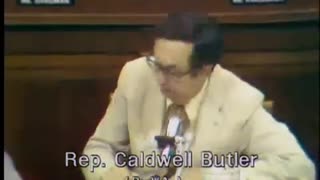 8:57:26
8:57:26
The Memory Hole
1 month agoNixon Impeachment Hearings Day 7 (1974-07-30)
560 -
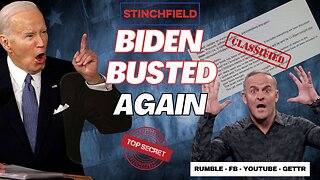 LIVE
LIVE
Grant Stinchfield
1 hour agoNational Security Put at Risk... Biden Personal Emails Discovered Containing the Unthinkable!
621 watching -
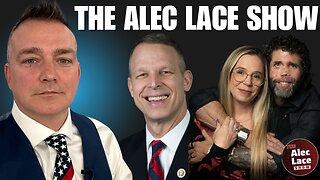 LIVE
LIVE
TheAlecLaceShow
12 hours agoGuests: Rep. Scott Perry | Jason & Erica Redman | Dems Want Government Shutdown | The Alec Lace Show
71 watching -
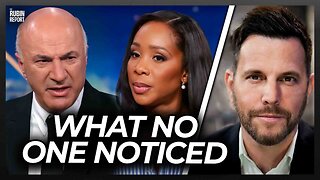 52:21
52:21
The Rubin Report
2 hours ago‘Shark Tank’ Legend Notices Something About Trump’s Canada Plan No One Noticed
38.2K32 -
 DVR
DVR
Benny Johnson
2 hours agoPANIC: Massive Democrat Money Laundering Scandal EXPOSED, ActBlue in Collapse! Kash Criminal Charges
41.7K56 -
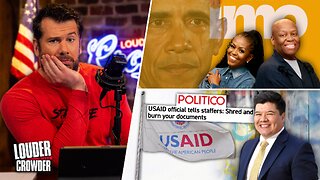 2:08:37
2:08:37
Steven Crowder
4 hours agoUSAID Shredding Conspiracy | What Everyone's Getting Wrong with Half Asian Lawyer Bill Richmond
295K176 -
 1:07:01
1:07:01
Timcast
3 hours agoTrump THREATENS MASSIVE 200% Tariff Against EU As GLOBAL Trade War IGNITES, China Hits Canada
64.1K60 -
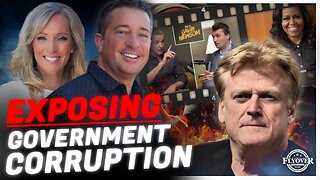 LIVE
LIVE
Flyover Conservatives
12 hours agoNew Documentary Reveals Life-Threatening Corruption in the U.S. Government! - Matt Thayer; Michelle Obama & Gavin Newsom Enter the Podcast Game—But Why Now?| FOC Show
598 watching -
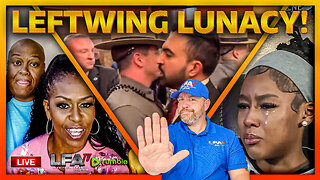
LFA TV
16 hours agoCORNERED RATS RETALIATE! | LIVE FROM AMERICA 3.13.25 11AM
29.8K10 -
 48:29
48:29
BonginoReport
5 hours agoSatanists Dedicate Kansas Capitol to Satan (Ep.159) - 03/13/2025
114K160